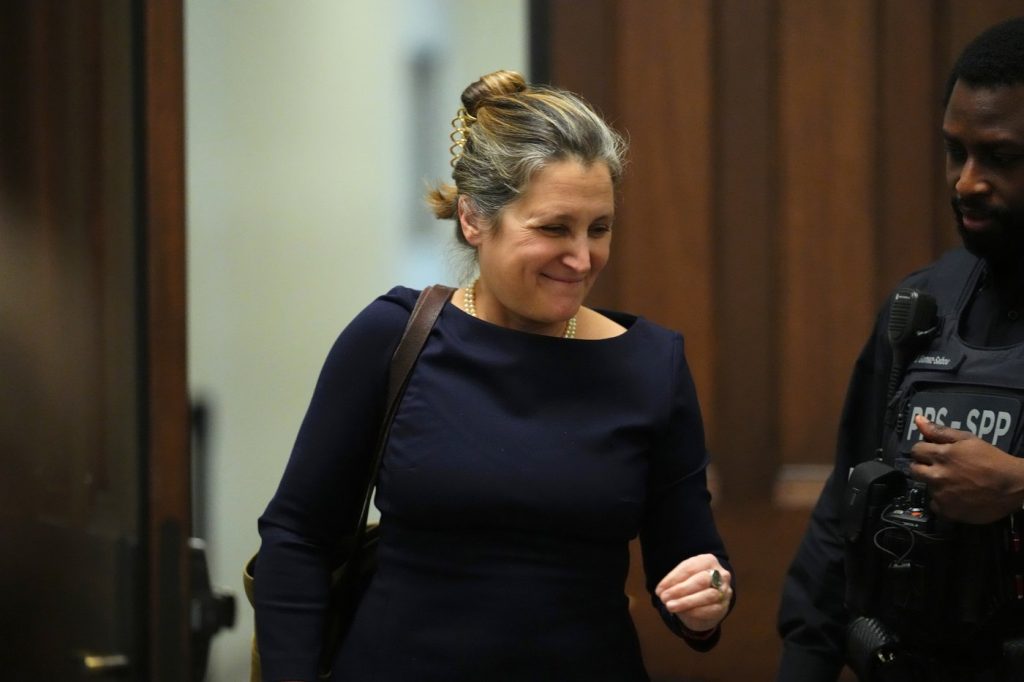The Canadian political landscape is currently buzzing with developments, particularly after Mark Carney officially announced his campaign for the Liberal leadership in Edmonton. This strategic move has shifted the spotlight onto Chrystia Freeland, the former finance minister, who is anticipated to declare her own candidacy imminently. Observers are eager to see whether Freeland will stand by her previous government’s consumer carbon pricing policy or pivot away from it, as speculated.
As potential candidates rush to finalize their decisions, they have less than a week to enter the race for leadership. Carney’s entrance adds a new dynamic to the competition, pushing Freeland to clarify her intentions and position within the party.
In the realm of international relations, Foreign Affairs Minister Mélanie Joly was busy in Washington, meeting with key U.S. politicians, including Senate Majority Leader John Thune and notable Senators Lindsay Graham, Jeanne Shaheen, and James Risch. Joly's meetings occurred against the backdrop of President-elect Donald Trump’s impending inauguration and his controversial vow to implement a 25% tariff on goods entering the U.S. from Canada and Mexico. Joly is expected to provide an update on these discussions later today, highlighting Canada’s ongoing efforts to mitigate the impact of such tariffs.
Energy and Natural Resources Minister Jonathan Wilkinson, also present in Washington, noted the uncertainty surrounding Trump’s tariff proposal, which has left both Republican senators and congressional members divided. Additionally, Prime Minister Justin Trudeau recently convened with provincial premiers in Ottawa to devise a cohesive response strategy to Trump’s tariff threats.
Meanwhile, Canadian tech companies are adapting to the current political landscape by adopting stringent European regulations, as the prorogation of Parliament has stalled critical cybersecurity and privacy bills. With Parliament prorogued until March 24, various bills concerning artificial intelligence, online harms, and privacy protections have been wiped off the agenda, requiring them to either be reintroduced or granted unanimous consent to resume debate. In the interim, tech companies are preparing to align their operations with the highest international standards, primarily looking to European legislation for guidance.
On a different front, the Township of Emo in Ontario is embroiled in a protracted legal dispute regarding the recognition of Pride Month. Activist Douglas Judson’s request to have June declared as Pride Month and to display a rainbow flag prompted a 3-2 vote against the motion in 2020. His appeals for acknowledgment have since led to a human rights battle that places the small community of Emo at the center of LGBTQ+ advocacy efforts in Canada. The absence of the rainbow flag stands in stark contrast to the nationwide observance of Pride Month, wherein many municipalities celebrate and support the LGBTQ+ community.
Finally, in the arts, married couple Paul Gross and Martha Burns are set to portray the tumultuous characters George and Martha in the Canadian Stage production of "Who’s Afraid of Virginia Woolf." The couple’s own marriage is seen as an asset in bringing depth to their characters, known for their deep-rooted dysfunction and toxicity. As they navigate the complex dynamics written by Edward Albee, Gross expressed that their personal connection offers a unique advantage in understanding and expressing the intricacies of long-term relationships.
This convergence of political maneuverings, international negotiations, social justice advocacy, and cultural performances highlights the multifaceted nature of current events in Canada. Each story reflects broader themes of leadership, resilience, and the ongoing struggle for equality and representation.










